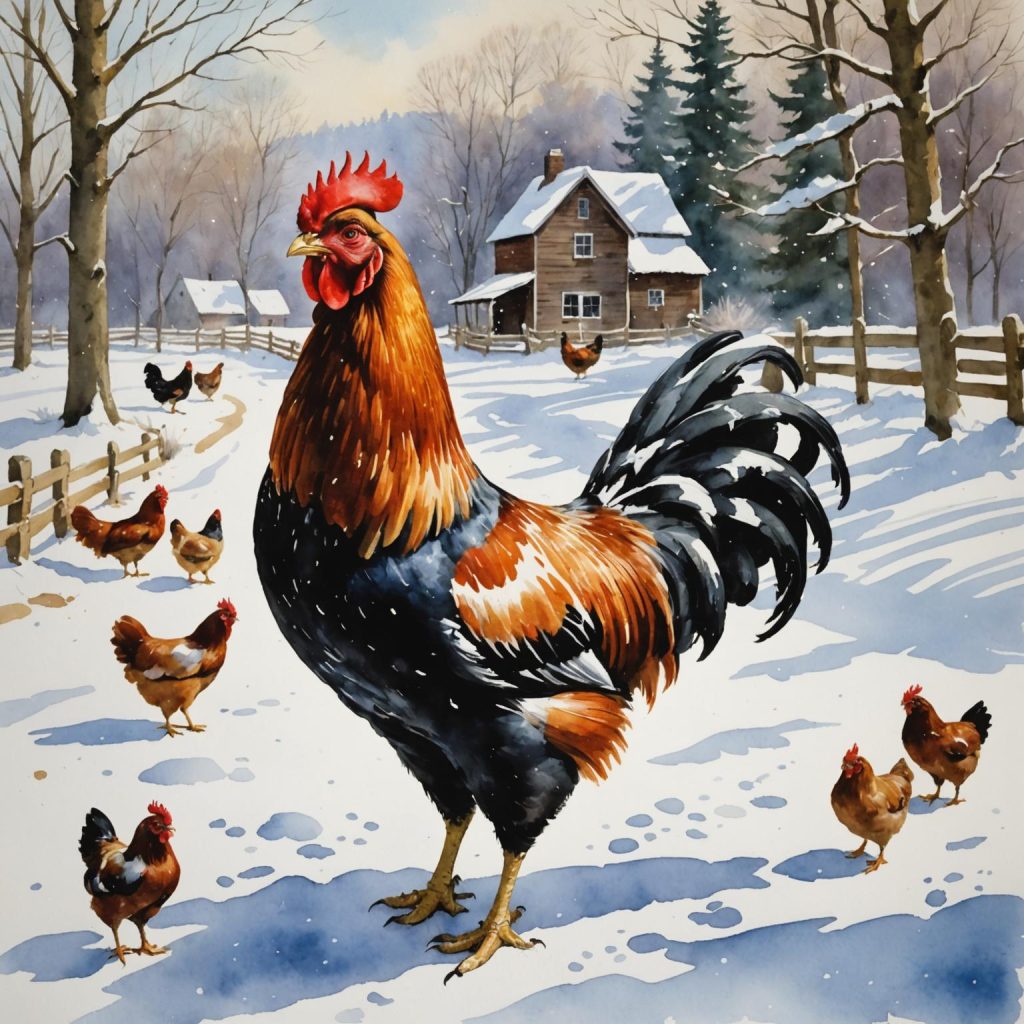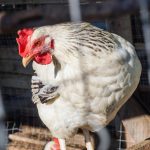As the winter months approach, it’s important for chicken owners to understand the specific needs of their feathered friends during this time. Chickens are sensitive to cold temperatures and can suffer from a variety of health issues if not properly cared for in the winter. Understanding the needs of chickens in the winter starts with recognizing that they require a warm and dry environment to thrive. Additionally, chickens need access to fresh water and a balanced diet to maintain their health during the colder months. It’s also important to be aware of the signs of cold stress in chickens, such as decreased egg production, lethargy, and pale combs and wattles. By understanding these needs, chicken owners can take the necessary steps to ensure their flock stays healthy and happy throughout the winter.
Chickens are not well-equipped to handle extreme cold temperatures, so it’s crucial for owners to provide them with proper shelter and bedding during the winter months. This means ensuring that the chicken coop is well-insulated and free from drafts, as well as providing ample bedding to keep the birds warm. Additionally, it’s important to regularly clean the coop to prevent moisture buildup, which can lead to frostbite and other health issues. By understanding the specific needs of chickens in the winter, owners can take proactive measures to provide a safe and comfortable environment for their flock.
Table of Contents
- 1 Providing Proper Shelter and Bedding for Chickens in the Winter
- 2 Maintaining a Healthy Diet and Water Supply for Chickens in the Winter
- 3 Protecting Chickens from Frostbite and Other Winter Health Risks
- 4 Managing Chicken Coop Ventilation and Temperature Regulation in the Winter
- 5 Tips for Keeping Chickens Active and Entertained During the Winter Months
- 6 Preparing for Spring: Transitioning Chickens from Winter to Spring Care
Providing Proper Shelter and Bedding for Chickens in the Winter
When it comes to providing proper shelter and bedding for chickens in the winter, there are several key factors to consider. First and foremost, the chicken coop should be well-insulated and free from drafts to protect the birds from cold temperatures. This may involve sealing any gaps or cracks in the coop and adding insulation to the walls and ceiling. Additionally, it’s important to provide adequate ventilation to prevent moisture buildup, while still maintaining a warm and dry environment for the chickens.
In terms of bedding, straw or wood shavings are commonly used to provide insulation and warmth for chickens during the winter months. It’s important to regularly clean and replace the bedding to prevent moisture buildup and keep the coop dry. By providing proper shelter and bedding for chickens in the winter, owners can help their flock stay warm and healthy throughout the colder months.
Maintaining a Healthy Diet and Water Supply for Chickens in the Winter
In addition to providing proper shelter and bedding, maintaining a healthy diet and water supply is essential for keeping chickens happy and healthy during the winter months. Chickens require a balanced diet that includes a mix of grains, protein, and fresh fruits and vegetables to maintain their health and egg production. It’s important for owners to ensure that their flock has access to high-quality feed that is specifically formulated for winter nutrition.
In addition to a healthy diet, chickens also need access to fresh water at all times, even in cold weather. This may require using heated waterers or regularly checking for frozen water sources to ensure that the birds stay hydrated. By maintaining a healthy diet and water supply for chickens in the winter, owners can help their flock stay strong and resilient throughout the colder months.
Protecting Chickens from Frostbite and Other Winter Health Risks
One of the biggest health risks for chickens in the winter is frostbite, which can occur on their combs, wattles, and feet if they are exposed to extreme cold temperatures. To protect chickens from frostbite, it’s important for owners to regularly check their birds for signs of cold stress and provide additional insulation or heat sources as needed. This may involve using heat lamps or heated perches in the coop to keep the birds warm.
In addition to frostbite, chickens are also susceptible to respiratory issues and other health problems in the winter if not properly cared for. This makes it crucial for owners to monitor their flock closely for any signs of illness or discomfort, and seek veterinary care if necessary. By taking proactive measures to protect chickens from frostbite and other winter health risks, owners can help ensure that their flock stays healthy and happy throughout the colder months.
Managing Chicken Coop Ventilation and Temperature Regulation in the Winter
Proper ventilation and temperature regulation are crucial for maintaining a healthy environment for chickens in the winter. While it’s important to keep the coop warm and dry, it’s equally important to provide adequate ventilation to prevent moisture buildup and maintain air quality. This may involve installing vents or windows in the coop that can be opened or closed as needed to control airflow.
In terms of temperature regulation, owners may need to use heat lamps or other heating sources to keep the coop at a comfortable temperature for their flock. It’s important to monitor the temperature regularly and make adjustments as needed to ensure that the birds stay warm without overheating. By managing chicken coop ventilation and temperature regulation in the winter, owners can create a safe and comfortable environment for their flock to thrive.
Tips for Keeping Chickens Active and Entertained During the Winter Months
During the winter months, it’s important for chicken owners to find ways to keep their flock active and entertained despite the colder weather. This may involve providing enrichment activities such as hanging treats or toys in the coop, or allowing the birds access to an enclosed outdoor area on milder days. Additionally, providing perches or roosts at different heights can encourage natural behaviors such as jumping and flying, which can help keep chickens active and engaged.
It’s also important for owners to spend time with their flock during the winter months, as social interaction can help prevent boredom and stress in chickens. This may involve spending time in the coop with the birds, talking to them, or even hand-feeding treats to create a positive bond. By finding ways to keep chickens active and entertained during the winter months, owners can help prevent behavioral issues and promote overall well-being in their flock.
Preparing for Spring: Transitioning Chickens from Winter to Spring Care
As winter comes to an end, it’s important for chicken owners to start preparing their flock for the transition from winter to spring care. This may involve gradually increasing outdoor time as temperatures warm up, allowing access to fresh grass and insects, and gradually transitioning back to a regular diet as natural food sources become more abundant.
Additionally, it’s important for owners to monitor their flock closely for any signs of illness or stress as they adjust to changing weather conditions. This may involve providing additional support such as vitamins or supplements if needed, as well as seeking veterinary care if any health issues arise. By preparing for spring and transitioning chickens from winter to spring care, owners can help ensure that their flock stays healthy and happy as they move into the warmer months ahead.
In conclusion, understanding the needs of chickens in the winter is essential for providing proper care and ensuring that they stay healthy and happy throughout the colder months. By providing proper shelter and bedding, maintaining a healthy diet and water supply, protecting chickens from frostbite and other health risks, managing chicken coop ventilation and temperature regulation, keeping chickens active and entertained, and preparing for spring, owners can help their flock thrive despite the challenges of winter weather. With proactive care and attention, chickens can stay strong and resilient throughout the colder months, setting them up for success as they transition into spring care.
Meet Walter, the feathered-friend fanatic of Florida! Nestled in the sunshine state, Walter struts through life with his feathered companions, clucking his way to happiness. With a coop that’s fancier than a five-star hotel, he’s the Don Juan of the chicken world. When he’s not teaching his hens to do the cha-cha, you’ll find him in a heated debate with his prized rooster, Sir Clucks-a-Lot. Walter’s poultry passion is no yolk; he’s the sunny-side-up guy you never knew you needed in your flock of friends!







